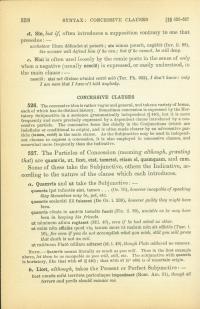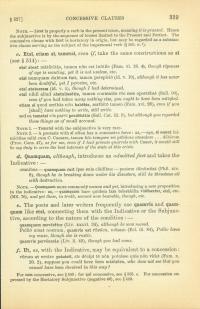526. The concessive idea is rather vague and general, and takes a variety of forms, each of which has its distinct history. Sometimes concession is expressed by the Hortatory Subjunctive in a sentence grammatically independent (§ 440), but it is more frequently and more precisely expressed by a dependent clause introduced by a concessive particle. The concessive force lies chiefly in the conjunctions (which are indefinite or conditional in origin), and is often made clearer by an adversative particle (tamen, certē) in the main clause. As the subjunctive may be used in independent clauses to express a concession, it is also employed in concessive clauses, and somewhat more frequently than the indicative.
527. The particles of concession (meaning although, granting that) are quamvīs, ut, licet, etsī, tametsī, etiam sī, quamquam, and cum.
Some of these take the subjunctive, others the indicative, according to the nature of the clause which each introduces.
a. Quamvīs and ut take the subjunctive.
quamvīs ipsī īnfantēs sint, tamen, etc. (Or. 76)
however incapable of speaking they themselves may be, yet, etc.
quamvīs scelerātī illī fuissent (De Or. 1.230)
however guilty they might have been
quamvīs cōmis in amīcīs tuendīs fuerit (Fin. 2.80)
amiable as he may have been in keeping his friends
ut nēminem alium rogāsset (Mil. 46)
even if he had asked no other
Ut enim nōn efficiās quod vīs, tamen mors ut malum nōn sit efficiēs. (Tusc. 1.16)
For even if you do not accomplish what you wish, still you will prove that death is not an evil.
ut ratiōnem Platō nūllam adferret (id. 1.49)
though Plato adduced no reasons
Note— Quamvīs means literally as much as you will. Thus in the first example above, let them be as incapable as you will, still, etc. the subjunctive with quamvīs is hortatory, like that with nē (§ 440); that with ut (ut nōn) is of uncertain origin.
b. Licet (although) takes the present or perfect subjunctive.
licet omnēs mihi terrōrēs perīculaque impendeant (Rosc. Am. 31)
though all terrors and perils should menace me
Note— Licet is properly a verb in the present tense, meaning it is granted. Hence the subjunctive is by the sequence of tenses limited to the present and perfect. The concessive clause with licet is hortatory in origin, but may be regarded as a substantive clause serving as the subject of the impersonal verb (§ 565, Note 1).
c. Etsī, etiam sī, tametsī (even if) take the same constructions as sī (see § 514).
Etsī abestmātūritās, tamen nōn est inūtile, etc. (Fam. 6.18.4)
Though ripeness of age is wanting, yet it is not useless, etc.
Etsī numquam dubium fuit, tamen perspiciō, etc. (id. 5.19)
Although it has never been doubtful, yet I perceive, etc.
etsī statueram (id. 5.5)
though I had determined
Etsī nihil aliud abstulissētis, tamen contentōs vōs esse oportēbat. (Sull. 90)
Even if you had taken away nothing else, you ought to have been satisfied.
Etiam sī quod scrībās nōn habēbis, scrībitō tamen. (Fam. 16.26)
Even if you [shall] have nothing to write, still write.
sed ea tametsī vōs parvī pendēbātis (Sall. Cat. 52.9)
but although you regarded those things as of small account
Note 1— Tametsī with the subjunctive is very rare.
Note 2— A protasis with sī often has a concessive force.
Ego, sī essent inimīcitiae mihi cum C. Caesare, tamen hōc tempore reī pūblicae cōnsulere . . . dēbērem. (Prov. Cons. 47)
As for me, even if I had private quarrels with Cæsar, it would still be my duty to serve the best interests of the state at this crisis.
d. Quamquam (although) introduces an admitted fact and takes the indicative.
Omnibus—quamquam ruitipse suīs clādibus—pestem dēnūntiat. (Phil. 14.8)
Though he is breaking down under his disasters, still he threatens all with destruction.
Note— Quamquam more commonly means and yet, introducing a new proposition in the indicative.
quamquam haec quidem iam tolerābilia vidēbantur, etsī, etc. (Mil. 76)
and yet these, in truth, seemed now bearable, though, etc.
e. The poets and later writers frequently use quamvīs and quamquam like etsī, connecting them with the indicative or the subjunctive, according to the nature of the condition.
quamquam movērētur (Liv. 36.34)
although he was moved
Polliō amat nostram, quamvīs estrūstica, mūsam. (Ecl. 3.84)
Pollio loves my muse, though she is rustic.
quamvīs pervēnerās (Liv. 2.40)
though you had come
f. Ut (as) with the indicative, may be equivalent to a concession.
Vērum ut errāre potuistī, sīc dēcipī tē nōn potuisse quis nōn videt? (Fam. 10.20.2)
Suppose you could have been mistaken, who does not see that you cannot have been deceived in this way?
For cum concessive, see § 549; for quī concessive, see § 535.e. For concession expressed by the Hortatory Subjunctive (negative nē), see § 440.


